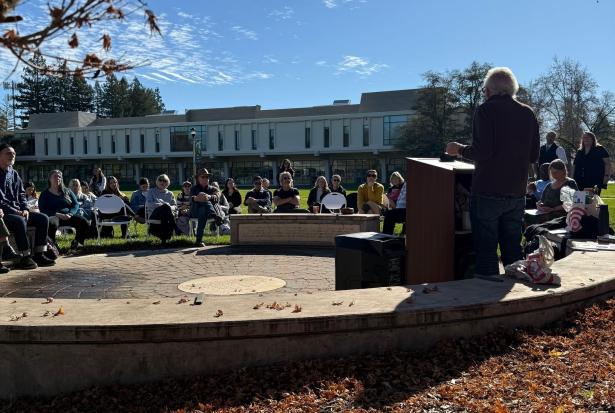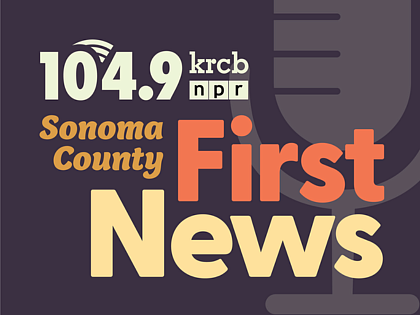 photo credit: Noah Abrams/KRCB
photo credit: Noah Abrams/KRCBFormer SSU professor Les Adler addresses the crowd of about 40, gathered at the Mario Savio Speakers' Corner on the SSU campus on Monday, December 2nd, 2024. Adler was both a colleague of Savio's at SSU and a peer at UC Berkeley, who attended Savio's famous speech on the steps of Sproul Hall in 1964.
No one moment has come to be more associated with Berkeley's Free Speech Movement than when then-student activist Mario Savio delivered an impassioned 1964 public appeal called "Bodies Upon the Gears."
On Monday afternoon students, activists, and educators at Sonoma State University, where Savio later taught, gathered to honor him on the 60th anniversary of his iconic speech.
"There's a time when the operation of the machine becomes so odious, makes you so sick at heart that you can't take part," Savio said, during that immortalized moment in 1964. "You can't even passively take part."
Mario Savio was a civil rights activist and student at the University of California, Berkeley, when he delivered those now famous words to nearly 4,000 students gathered on the steps of Sproul Hall on December 2, 1964.
"And you've got to put your bodies upon the gears and upon the wheels, upon the levers, upon all the apparatus," Savio said. "And you've got to make it stop. And you've got to indicate to the people who run it, to the people who own it, that unless you are free, the machine will be prevented from working at all."
60 years on, about 40 of Savio's former colleagues, students, and many contemporary members of the Sonoma State community gathered on the Rohnert Park campus's Stevenson Quad.
Savio was a professor at SSU from 1990 to 1996; and Mary Gomes, a long time professor of psychology at Sonoma State, organized the memorial on the anniversary of his famous speech.
"Most students are completely not aware of him at all," Gomes said. "As a free speech movement activist or as a faculty member here; and most of the faculty who have heard of him, many did not know that he taught here."
Savio's time at SSU was marked by continued activism, supporting students protesting against an unpopular fee hike put forward by the university administration. It was a struggle which made the already well-regarded Savio, all the more beloved, said Mette Adams, a student at the time.
"Mario received many interview requests due to his status," Adams said. "Mario would agree to the interviews, and then he'd come to me or one of the students and say, 'Hey, I got this journalist. He's coming. He thinks he's coming to talk to me, but this is not my struggle. It's your struggle. You show up at the interview.' And at first of course, we were terrified 'cause we'd never done that before, but we did, and they listened to us and articles got published by the students, for the students because of Mario."
Looking not just backwards at Savio's legacy, Professor Mary Gomes pointed forward to Savio's activism as a guide for campus struggles to come.
That includes California State University's new so-called "time, place, and manner" rules put in place following the flood of pro-Palestine student activism last spring.
"The chilling of speech can happen not only through active punishment, but through an intimidating atmosphere where people end up self-censoring," Gomes said. "And so part of, to me, the importance of having an event like this was the reminder to all of us of the reasons, and not to self-censor."
Mario Savio, born in New York City in 1942, died at Palm Drive Hospital in Sebastopol in 1996, following complications from a heart attack.

 Live Radio
Live Radio




